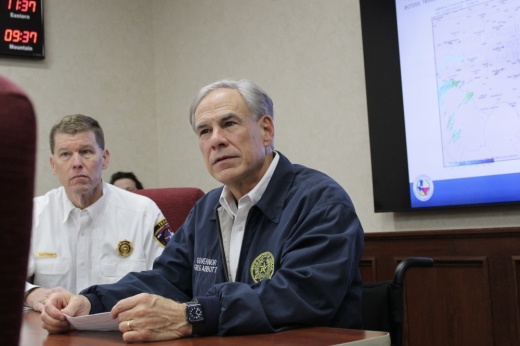Texans should contact their local utility providers if they experience power outages, Gov. Greg Abbott said during a Jan. 8 news conference in Austin. Widespread outages are unlikely, but some people could lose power due to fallen tree branches or ice on power lines, he said.
“The good news is... the power grid looks very, very strong,” Abbott said. “If there is a loss of power, it’s not going to be because of the power grid. It's going to be because of some impact on a local power line that your local power provider is going to be responsible for addressing.”
What you need to know
There will be a “more than adequate supply of power to serve the state” during the cold snap, according to Pablo Vegas, CEO of the Electric Reliability Council of Texas, which operates the grid.
ERCOT issued a “weather watch” for Jan. 6-10, due to the cold weather and subsequent high electric demand. The weather watch does not indicate an emergency and is not a call for conservation, according to ERCOT.
In the nearly four years since Winter Storm Uri blanketed Texas with snow, leaving millions without power for days and leading to nearly 250 deaths, lawmakers and energy regulators have implemented reforms to prevent a similar disaster.
Over 10,000 megawatts of generation capacity have been added to Texas’ power grid since March, which will help reduce the likelihood of future outages, officials said Dec. 3. A 2021 state law required energy providers to “weatherize” their facilities to withstand extremely hot or cold temperatures after some power plants shut down during Uri.
“We've got more supply on the grid than we’ve ever had before,” Vegas said Jan. 8. “The generator and transmission community has been doing everything they need to do to make sure that their facilities will be running safely and reliably throughout events just like this.”
Temperatures will also be warmer this time around, according to the National Weather Service. While temperatures fell as low as 6 degrees Fahrenheit in February 2021, temperatures are projected to rise above freezing each day this week.
Winter precipitation is expected to begin around 6 a.m. Jan. 9 in Dallas-Fort Worth, according to the NWS, and the low temperature will be in the 20s late Jan. 10.
Put in perspective
“Over the last week and throughout, really, the whole winter, the generating community, the transmission [and] distribution community, has done all the work necessary to weatherize and winterize all of their facilities,” said Thomas Gleeson, chair of the Public Utility Commission of Texas. “They've done extra measures to ensure that any vegetation that needs to be cut back and managed has been done, so that ice on trees will have a minimal impact on their infrastructure.”
In January 2023, Winter Storm Mara coated power lines and trees with ice in Central Texas, knocking out electricity for at least 170,000 homes. Last July, over 2 million people lost power in the Houston area after Hurricane Beryl pummeled the region. In the aftermath of Beryl, state leaders said utility companies needed to do more to prepare for future storms, such as clearing vegetation.
“What happened in prior events... was completely unacceptable,” Abbott said. “We’ve put extraordinary pressure on all of these power providers to make sure that they remove the vegetation that could cause power lines to come down. Oncor, which is responsible for a lot of the North Texas area that will be mostly impacted by this winter storm, has been very aggressive over the past week or two in advance of this storm, to make sure they are doubling their efforts to remove vegetation in the area.”
More details
Nim Kidd, chief of the Texas Division of Emergency Management, said Texans should avoid unnecessary travel during the winter storm.
“My biggest concern right now is people getting out on the roads, because we'll see temperatures warm up above freezing during the day, and then any moisture that's on the ground is going to refreeze at night,” Kidd said. “The roads can be very treacherous if you can't see where you're driving.”
Drivers who get stranded on icy roads should call 1-800-525-5555 for roadside assistance, Abbott said. This number is also found on the back of all Texas driver licenses.
The Texas Department of Transportation has been pre-treating roadways across the state since Jan. 3, TxDOT deputy executive director Brian Barth said.
“We believe that pre-treating with a brine liquid, which is a mix of water and salt, really helps us manage the ice accumulation,” Barth said. “So one, it helps from ice accumulating, and then two, if ice does accumulate, it keeps that ice from bonding with the pavement.”
TxDOT is also bringing crews from South Texas, which is not expected to be impacted by the storm, to help manage road conditions in Dallas-Fort Worth.
Officials said people should still be able to attend the Cotton Bowl Classic, a playoff matchup between the University of Texas-Austin and Ohio State University. The game will be held Jan. 10 in Arlington.
“With potential snow or icing conditions in the DFW area, on I-35, on I-20, on all the different interstates or roadways that lead to the Dallas-Fort Worth area, it is incredibly important that everybody drives extra safe,” Abbott said. “If you're very cautious and slow and methodical in your driving, everything's going to be just fine.”
Final takeaways
Protecting people’s lives and keeping the public safe are most important during the winter storm, officials said.
“I want you to also make sure that you have blankets at your house, that you have enough food, that you have enough water and that you know the number to your local power company so that you can get information from them about when your power may be back on,” Kidd said.





